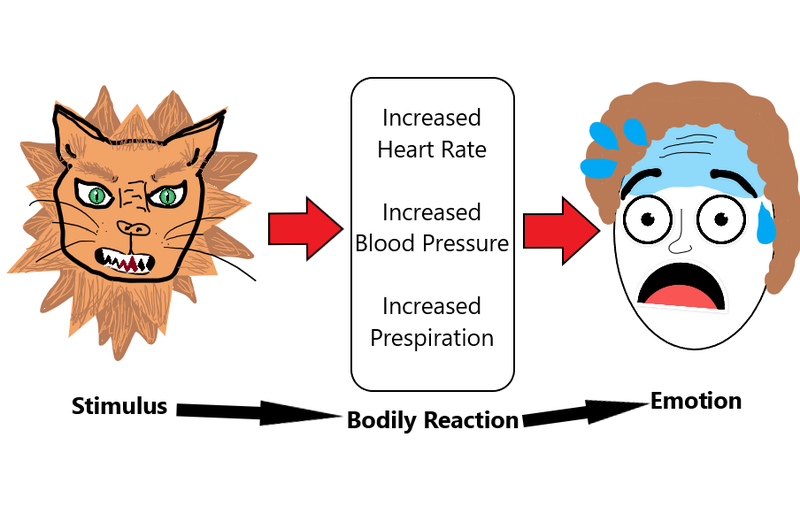Topics
7.1.1 Psychological Effects
7.1.2 Mental Health
7.1.3 Emotions
7.1.4 Loneliness
7.1.5 Coping with Stress
7.1.6 Fear of Recurrence
7.1.7 Psychological Counsellors
7.1.8 Spiritual Health & Wellbeing
Learning Objectives
➤ Explain the psychological effects during and after breast cancer treatment.
➤ Describe strategies for coping with psychological effects.
➤ Describe strategies for coping with fear of cancer recurrence.
➤ Explain how spirituality can improve health and wellbeing.
7.1.1 Psychological Effects
Breast cancer can cause a variety of psychological effects both during and after treatment.
Potential psychological effects include:
- hopelessness,
- depression,
- anxiety,
- fear (e.g., death, pain and loss),
- low self-esteem and self-image,
- and anger (National Cancer Institute, 2018).
See Image 28 for how a stimulus can influence your psychological state (U3177076, 2021).
Image 28: Lion -> bodily reaction -> fear

(U3177076 / Wikimedia Commons)
CC BY-SA
7.1.2 Mental Health
If you have breast cancer, you are more likely to develop mental illnesses such as anxiety and depression (Tsaras et al., 2018). Furthermore, the physical and emotional challenges associated with breast cancer can lead to a lower quality of life. These challenges include issues with self-image, fatigue, and life changes.
Studies have found that depression and anxiety are relatively common within the first year of a breast cancer diagnosis (Tsaras et al., 2018). If you live in a rural setting, your likelihood of developing these conditions increases further.
Depression is different from regular sadness in that it lasts a long time and impairs your everyday life (National Cancer Institute, 2018). Symptoms of depression can include:
- emotional numbness,
- concentration problems,
- moodiness,
- changes in sleep or appetite,
- and suicidal thoughts (National Cancer Institute, 2018).
If your depression or anxiety begins to interfere with your day-to-day life, contact your healthcare provider, and they can refer you to other specialists (e.g., psychiatrist or therapist) if needed (National Cancer Institute, 2018).
7.1.3 Emotions
You may find yourself feeling a wide variety of emotions during and after your breast cancer treatment. Some of these emotions are listed below.
Anger
Anger is a normal feeling to have throughout your breast cancer journey (National Cancer Institute, 2018). You might direct your anger at your cancer, people around you, yourself, or other things in your life. It is important that you acknowledge these feelings and work through them in a healthy way.
Sadness
Like anger, being sad is completely normal when you have breast cancer (Canadian Cancer Society, n.d.24). Having breast cancer can bring a sense of great loss:
- loss of what your life was,
- loss of self-image,
- loss of a clear future,
- and loss of ability to do things you enjoy (Canadian Cancer Society, n.d.24).
Coping with Emotions
Although these emotions are normal, you still need to work through them in a healthy and productive way (Canadian Cancer Society, 2018b). Talking to others about your feelings is important for processing them; you can talk to a friend, family member, breast cancer support group, or healthcare professional.
Besides talking to others, you can also do certain activities to decrease these feelings, such as journaling, exercising, and doing your hobbies (Healthwise Staff, 2023b).
If you would like to hear about the breast cancer experience of a person living in Nunavut, check out Video 19 (Canadian Partnership Against Cancer, 2010b).
Video 19
The Truth Of It Video Series: Beatrice (Canadian Partnership Against Cancer, 2010b)
7.1.4 Loneliness
You may feel lonely during your breast cancer experience (Canadian Cancer Society, 2018b). A variety of factors can contribute to loneliness, including:
- people not being able to relate to your experience,
- missing out on events due to treatment (e.g., birthdays),
- and spending more time alone (Canadian Cancer Society, 2018b).
It is important to voice these feelings to people in your life and, if it would help, seek out others who have been through the same experience (Canadian Cancer Society, 2018b).
You can ask your healthcare team for suggestions on how to find local breast cancer support groups and other support services (National Cancer Institute, 2018b).
7.1.5 Coping with Stress
Breast cancer is a stressful experience (National Cancer Institute, 2018). Finding ways to cope with stress can help make the experience easier for you. Some activities you can do include:
- cooking and baking,
- reading,
- socializing with friends,
- exercising,
- watching television,
- playing games,
- and other activities that bring you joy (National Cancer Institute, 2018).
You might find it helpful to talk to a counsellor or therapist who can recommend other things you can do to cope with stress (National Cancer Institute, 2018). For example, they could suggest complementary and alternative therapies that may benefit you.
7.1.6 Fear of Recurrence
You might have a lot of anxiety and fear surrounding your cancer returning (National Cancer Institute, 2018). There are various ways you can cope with these feelings, including:
- learning as much as you can about your cancer,
- staying positive while still acknowledging the bad days,
- remembering that cancer does not discriminate, and it is not your fault,
- focusing on what you can control (e.g., lifestyle changes),
- distracting yourself through socializing or hobbies,
- staying on top of recommended testing (e.g., mammograms and blood work),
- and finding strategies that help you relax (National Cancer Institute, 2018).
Talking to your healthcare team can help you to understand your risk of breast cancer recurrence.
If you want to hear a personal experience about fear of recurrence, check out Video 20 (Breast Cancer Network Australia, 2017).
Video 20
Kym’s story – Fear of cancer recurrence (Breast Cancer Network Australia, 2017)
7.1.7 Psychological Counsellors
As mentioned previously, a counsellor can help you navigate your emotions and feelings.
BC Cancer has various resources on how to connect with a counsellor (in-person or virtual).
Patient & Family Counselling (BC Cancer, n.d.13)
7.1.8 Spiritual Health & Wellbeing
Spirituality can be an important aspect of your health if you have cancer (Leão et al., 2021). When looking at the wide range of feelings caused by cancer, incorporating spirituality into your daily life can help improve these feelings.
Spirituality can help:
- give meaning to situations,
- encourage healing from illness,
- gain a new outlook on life,
- and determine what you value (Leão et al., 2021).
You can incorporate spirituality into your life in many ways (Canadian Cancer Society, 2018). You could join an organized religion or partake in spiritual practices from many cultures and religions. Ultimately, there is no right way to incorporate spirituality, so do it in whatever way works best for you.
Image 29: Improving health and wellness through religion

(Tonny Mpagi / Wikimedia Commons) CC BY-SA